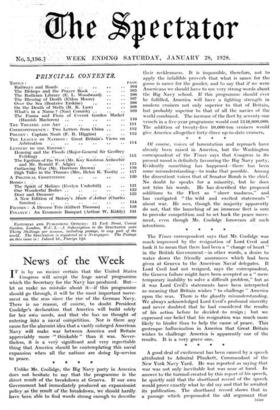The Times correspondent says that Mr. Coolidge was much impressed
by the resignation of Lord Cecil and took it to mean that there had been a " change of heart " in the British Government—in other words, a desire to water down the friendly assurances which had been given at -Geneva to the American Naval delegates. If Lord Cecil had not resigned, says the correspondent, the Geneva failure might have been accepted-as a " mere temporary inability to solve a difficult problem," but as it was Lord Cecil's statements have been interpreted as meaning" that Britain wishes " to challenge " America upon the seas. There is the ghastly misunderstanding. We always acknowledged Lord Cecil's profound sincerity and never doubted that he had considered the results of his action before he decided • to resign ; but we expressed our-belief that his resignation was much more likely to hinder than to help the cause of peace. This grotesque hallucination in America that Great Britain wishes to challenge America is apparently one of the results. It is a very grave one.
* * * *










































